This vaccine calculator tells you when you'll get the second dose of the COVID-19 vaccination

When will you get your second vaccination for coronavirus? This vaccine calculator estimates when you'll be invited to get your next doses of the COVID jab for peak immunity...
Since December last year, the UK has been successfully rolling out its COVID-19 vaccination programme. The Pfizer/BioNTech and the Oxford/AstraZeneca vaccines were the first to be offered out to those most in need around the country, and the Moderna vaccine is now also on offer in some places.
To date, over 31 million people in Britain have been given both doses of the jab, while almost 44 million have got at least one vaccination in the bag. Due to concerns about how quickly the Delta variant has spread in the UK, Prime Minister Boris Johnson announced last week that the fourth stage of the roadmap out of lockdown would be postponed until 19 July. He simultaneously brought forward the date he anticipates that every adult in the country will have received their first vaccination from 31 July to 19 July, and all adults aged 18 or over can now get vaccinated against COVID-19 in the UK.
Based on the fact that all adults are now eligible for the vaccine, the chances are you're probably thinking about when you'll get your second one. If you didn't book via the NHS, you may not already have your second dose appointment locked in, but will no doubt be keen to reach peak immunity as soon as possible. Especially considering that Sir Patrick Vallance has now confirmed the AstraZeneca, Pfizer and Moderna vaccines do provide sufficient immunity against the more transmissable Delta variant - particularly after two doses.

Luckily, there's a handy online vaccine calculator that can give you a better idea of when you'll receive your second vaccine by. Omni Calculator's Vaccine Queue Calculator for the UK asks you to input various information - including your age, whether you're a care home or health worker, if you're currently pregnant, and more - and then it works out roughly when you might be expected to receive an invite for your next dose, based on the most recent roll-out rate across the country. You can try it for yourself here.
As a healthy 30-year-old woman, I had my first dose of the vaccine in late May. At the current roll-out rate (which, in the past 7 days was just over 2.9m million doses per week), the latest I can possibly expect to be offered the second dose of the vaccine is by 24 September, but it will no doubt be sooner as the longest the NHS tries to give individuals between doses is 12 weeks.

It's a huge achievement that so many people have now gained a level of immunity from the virus, after working through all the age groups. The government has always been decisive about the fact age would be the "biggest priority" (in the words of Deputy Chief Medical Officer Professor Jonathan Van-Tam) when working out who would be offered the jab first. And quite rightly so; coronavirus is known to pose a greater risk the older you are.
However, there were numerous other factors that were taken into consideration when it came to working out who was a priority for getting a jab. The government's vaccine task-force previously drew up a list to lay out who is eligible for the vaccination first, which largely used occupation, age, and medical history as an assessment of vulnerability to coronavirus. As well as that, experts also took into account various other characteristics that may put a person at higher risk of serious illness resulting from the virus. These included people whose ethnicity or high BMI put them more at risk, as well as whether they smoke, and what their housing situation is. This makes sense, given that research shows those who are overweight and who are from a Black, Asian or Minority Ethnic background have a higher chance of falling seriously ill with COVID.
The core order of priority, which stands in conjunction with other factors, was:
Who has been offered the COVID-19 vaccine first?
Older adults' resident in a care home and care home workers
All those 80 years of age and over, and health and social care workers
All those 75 years of age and over
All those 70 years of age and over
All those 65 years of age and over
High-risk adults under 65 years of age
Moderate-risk adults under 65 years of age
All those 60 years of age and over
All those 55 years of age and over
All those 50 years of age and over
Rest of the population (priority to be determined)
Does the vaccine stop the spread of the virus, as well as stopping people getting sick?
This was something experts couldn't be sure of prior to the vaccine being rolled out. While the vaccine trials showed high efficacy rates in preventing sickness from COVID-19 in those who had the jabs, it wasn't clear whether those who have been vaccinated could still unknowingly spread the virus (even if it hadn't taken hold in their own bodies thanks to their immunity).
In exciting news, one study suggested that the Oxford/Astrazeneca vaccine is having a "substantial" effect on reducing the transmission of the virus. Similarly, studies on the Pfizer vaccine in Israel (which led the way globally in terms of how quickly the population became vaccinated) earlier this year showed that it had stopped 89.4% of virus transmission in the country. Another study from Public Health England showed that a single dose of either the Pfizer or AstraZeneca vaccines can reduce household transmission of the virus by up to half. Health Secretary Matt Hancock described the research as "terrific news," and he's right - it's certainly very encouraging. If vaccinated people are less likely to be able to spread the virus, we have more chance of properly curbing its spread across the population.
Will we need vaccine boosters yearly?
As it stands, the UK has ordered more than 400 million doses of seven different coronavirus vaccines (most of which are not yet available for use). The majority of these vaccines require two doses, meaning there's more than enough for at least 200 million people to be vaccinated. But our population is around 67 million, so how come we're buying more vaccines than we have people?
There are two possible reasons for that. Firstly, it may be because we are planning to donate some of our vaccine supplies to other countries who are in need. As it stands, very few of the 29 poorest countries in the world have received any jabs, but if we don't vaccinate globally, it's hard to see how we'll overcome the pandemic.
Speaking to BBC Breakfast in February, World Health Organisation spokesperson Margaret Harris said: "There have been a number of very interesting analyses showing that just vaccinating your own country and then sitting there and saying 'we’re fine' won’t work economically. That phrase 'no man is an island' applies economically as well… Unless we get all societies working effectively once again, every society will be financially affected."

The other suggestion as to why the government has bought so many more vaccines than they have people is that the vaccine programme may be ongoing over the coming years. As the virus mutates, it's possible that people will need a booster jab to maintain immunity, although there is currently limited scientific evidence to confirm this either way.
In June, Health Secretary Matt Hancock revealed that plans for a COVID booster jab programme in the autumn will be laid out in the coming weeks. "We are currently trialling which combinations of jabs are the most effective," he told BBC Breakfast. "In the next few weeks, when we get the clinical data through on what's the most effective combinations to have… then we'll set out all the details for the booster programme for the autumn."
By placing bulk orders for next year (and with the option to order more for years to come - 90 million additional Valneva doses have been optioned for 2023 and 2025 if needed) it suggests the government is planning for the possibility of revaccinating the population in years to come.
But whether we end up needing more vaccinations in future not, I think the one thing we can all agree on is that the existence of the vaccine and the fact we're almost at the final stage of the roadmap out of lockdown is providing some light at the end of this very, very dark coronavirus tunnel. Thank F for that.
The information in this story is accurate as of the publication date. While we are attempting to keep our content as up-to-date as possible, the situation surrounding the coronavirus pandemic continues to develop rapidly, so it's possible that some information and recommendations may have changed since publishing. For any concerns and latest advice, visit the World Health Organisation. If you're in the UK, the National Health Service can also provide useful information and support, while US users can contact the Center for Disease Control and Prevention.
Follow Cat on Instagram.
Cosmopolitan UK is out now and you can SUBSCRIBE HERE.
Like this article? Sign up to our newsletter to get more articles like this delivered straight to your inbox.
You Might Also Like


